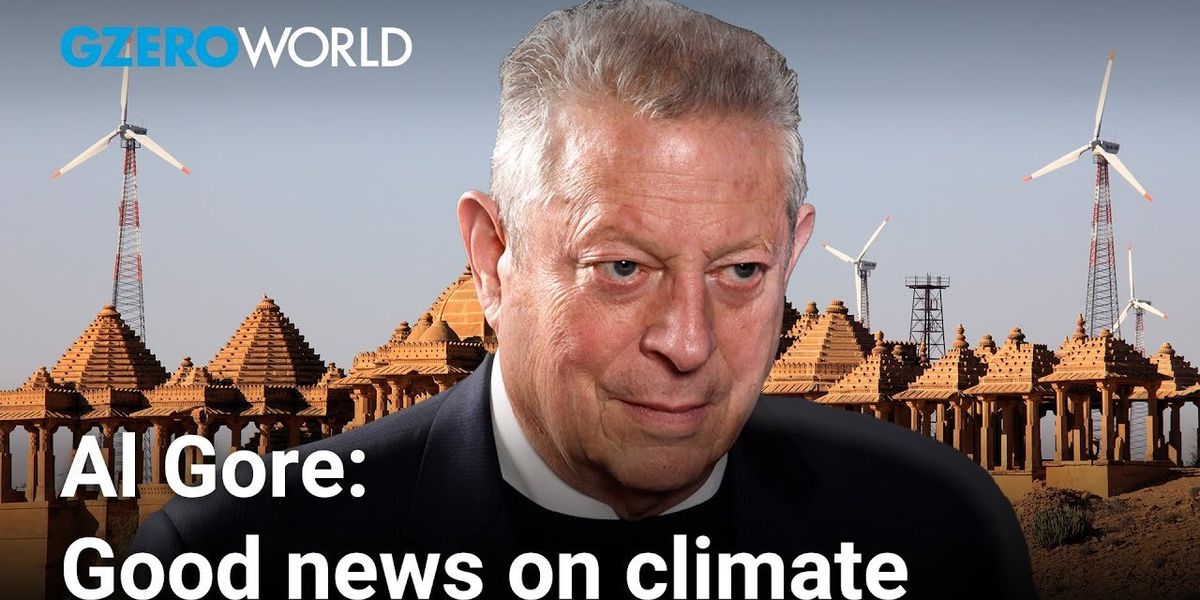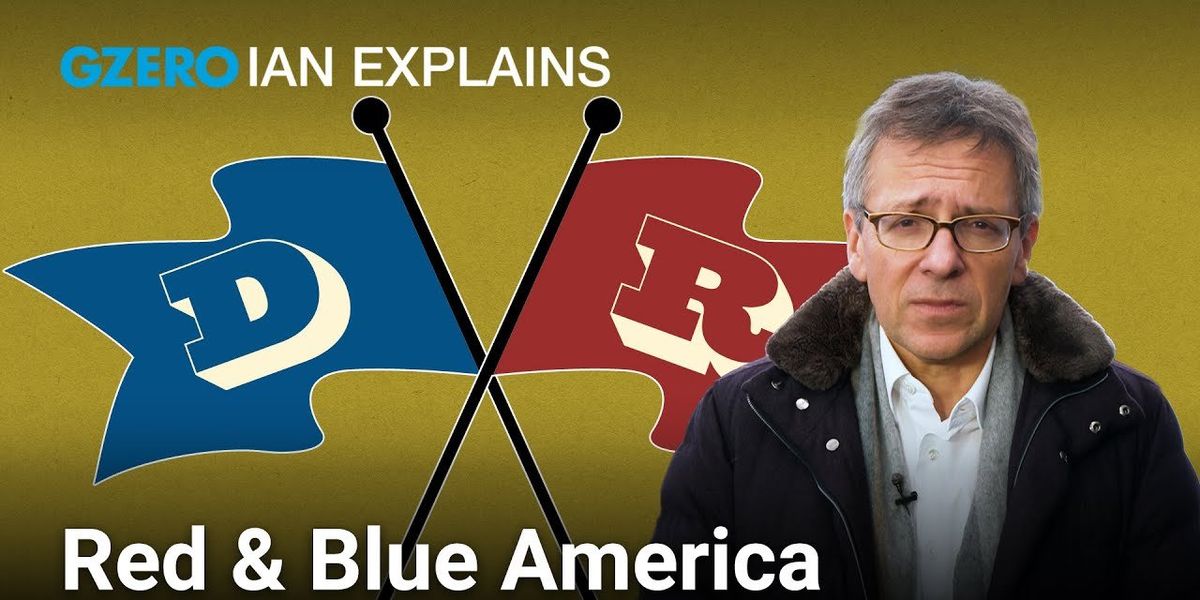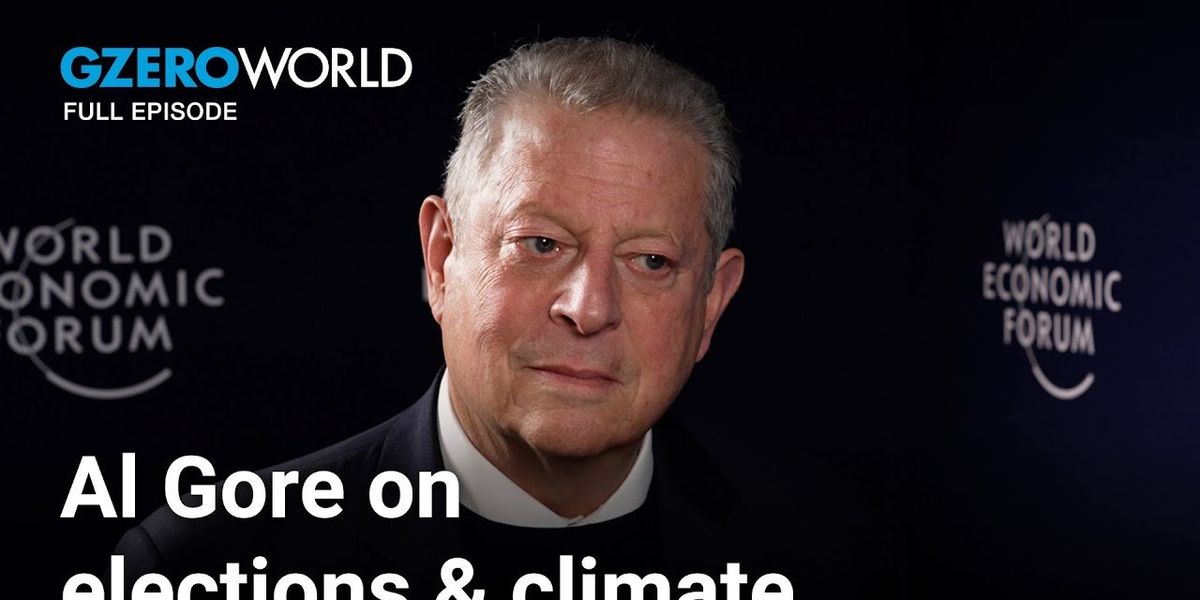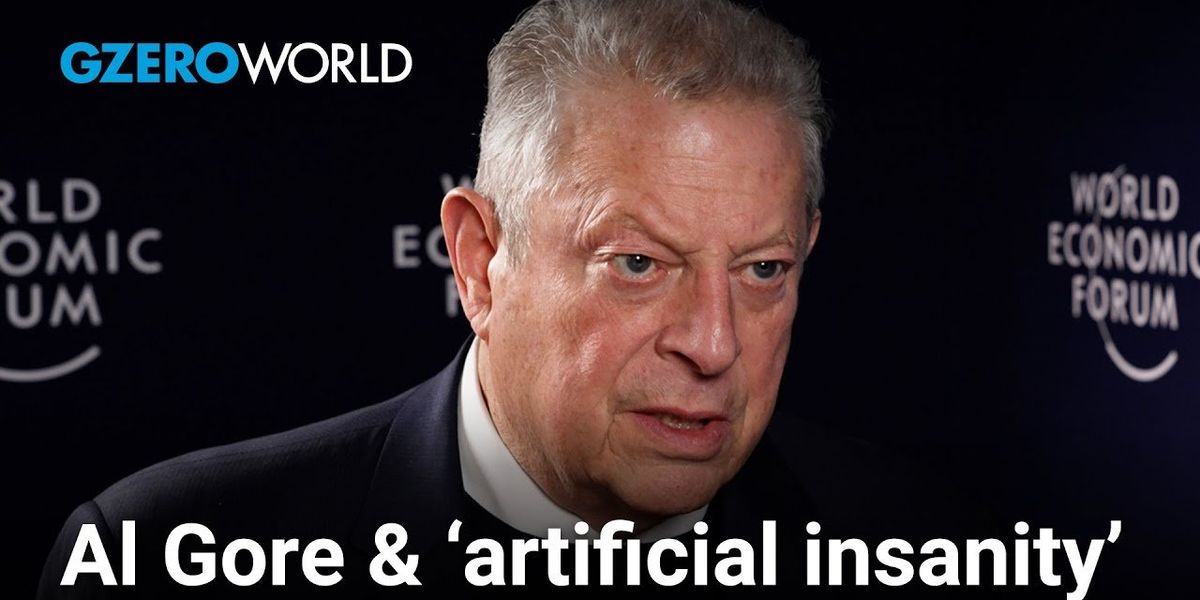Trending Now
We have updated our Privacy Policy and Terms of Use for Eurasia Group and its affiliates, including GZERO Media, to clarify the types of data we collect, how we collect it, how we use data and with whom we share data. By using our website you consent to our Terms and Conditions and Privacy Policy, including the transfer of your personal data to the United States from your country of residence, and our use of cookies described in our Cookie Policy.
{{ subpage.title }}
Al Gore is optimistic about our climate future
Former US Vice President Al Gore is known to many as the Paul Revere of climate change, alerting the world to the dangers of a warming planet and other "inconvenient truths" at a time when only 2/5 Americans were onboard with his message. It earned him a Nobel Peace Prize.
But today, Al Gore has good news to share. In a wide-ranging interview with Ian Bremmer on the sidelines of the World Economic Forum in Davos, Gore is clear-eyed but optimistic about our climate future.
"If we get to true net zero and stop incrementally adding to the amount of heat-trapping gas that's there, the temperatures will stop going up almost immediately with a lag of as little as three to five years. Now, that's new science. It's well-confirmed now. They used to believe that it would keep going even after we reach net zero, but no, it will not. The even better news is that if we stay at true net zero, then half of all the human-caused CO2 and methane will fall out of the atmosphere in as little as a quarter of a century."
Watch the full GZERO World episode: Al Gore on US elections & climate change
Catch GZERO World with Ian Bremmer every week at http://gzeromedia.com/gzeroworld or on US public television. Check local listings.
Ian Explains: How the US turned red and blue
Do you live in a red state or a blue state? Until fairly recently, such a question would have been nonsensical in the US. Ian Bremmer rolls back the clock on GZERO World to take a look.
On November 4, 1980, NBC News became the first major network to call the presidential election for Ronald Reagan. What stands out about this clip is not the absolute drubbing that President Carter received, but those colors on that map. States that had gone for Reagan are blue, states yet to be decided are that sickly 1980s yellow, and lonely little Georgia, which native son Jimmy Carter had managed to hold on to, is red.
It wasn’t, in fact, until the contested 2000 election between then Vice President Al Gore and Texas Governor George W Bush that major news networks agreed on a standard red-state-Republican // blue state-Democrat map scheme. That’s right, one of the most iconic signifiers of Republican or Democrat identity—second only to the elephant and donkey—is a modern invention, and one borne out of confusion.
Al Gore’s legacy will forever be tied to his fateful decision to put the peaceful transfer of power over his personal ambitions. He was also acknowledging a shared reality, as unpalatable as it might have been for himself, where George W Bush would be the next president of Red and Blue states, alike.
Watch the full GZERO World episode: Al Gore on US elections & climate change
Catch GZERO World with Ian Bremmer every week at gzeromedia.com/gzeroworld or on US public television. Check local listings.
Al Gore on US elections & climate change
Ian reports from the 54th World Economic Forum in Davos, Switzerland, where the theme this year is “Rebuilding Trust in a Fractured World.” And for sure, confidence in major institutions like governments, churches, and the media is at historic lows. Add to that equation a year that will test democracy like none we’ve seen—as many as 70 elections will take place around the world in 2024. None will be more watched—whether in Davos or Des Moines—than the US presidential election.
Al Gore is no stranger to contested elections, and shares his take on the current state of American politics and some positive news about the progress of climate action. The conversation touches on the most pressing topics at Davos: artificial intelligence, climate change, and deep concerns about the 2024 US election and American democracy.
Catch GZERO World with Ian Bremmer every week at gzeromedia.com/gzeroworld or on US public television. Check local listings.
Al Gore's take on American democracy, climate action, and "artificial insanity"
Listen: In this episode of GZERO World podcast, Ian Bremmer sits down with former US Vice President Al Gore on the sidelines of Davos in Switzerland. Gore, an individual well-versed in navigating contested elections, shared his perspectives on the current landscape of American politics and, naturally, his renowned contributions to climate action.
While the mainstage discussions at the World Economic Forum throughout the week delved into topics such as artificial intelligence, conflicts in Ukraine and the Middle East, and climate change, behind the scenes, much of the discourse was centered on profound concerns about the upcoming 2024 US election and the state of American democracy. The US presidential election presents substantial risks, particularly with Donald Trump on the path to securing the GOP nomination.
Subscribe to the GZERO World Podcast on Apple Podcasts, Spotify, Stitcher, or your preferred podcast platform, to receive new episodes as soon as they're published.
- Podcast: Can the US get its act together? Susan Glasser & Peter Baker on "the world’s greatest geopolitical crisis" ›
- America vs itself: Political scientist Francis Fukuyama on the state of democracy ›
- Divided we fall: Democracy at risk in the US ›
- Francis Fukuyama: Americans should be very worried about failing democracy ›
- Al Gore: "Artificial insanity" threatens democracy ›
- Ian Bremmer: How AI may destroy democracy ›
- Trump's immunity claim: US democracy in crisis ›
Al Gore: "Artificial insanity" threatens democracy
It is not a partisan statement to acknowledge that the future of American democracy is very much an open question. In 2020, we witnessed the first non-peaceful transition of power from one US presidential administration to another for the first time in modern history. And if past is prelude, 2024 could be a good deal worse. So what accounts for the imperiled state of democracy? Misinformation, coupled with technology, is a big part, says former vice president and Nobel laureate Al Gore in an upcoming episode of GZERO World.
Ian Bremmer caught up with Gore on the sidelines of the 2024 World Economic Forum in Davos, Switzerland to talk about the upcoming US election and, as you might expect, the existential threats posed by climate change. In this clip, Gore talks about today's witches' brew of new technologies, social media, and a lack of shared trust amongst Americans.
"These algorithms that suck people down proverbial rabbit holes, they're more like the pitcher plants with slippery sides and at the bottom of the rabbit hole, that's where the echo chamber is. And people who dwell long enough in the echo chamber become vulnerable to a new kind of AI. Not artificial intelligence, but artificial insanity."
Catch Al Gore's full conversation with Ian Bremmer in next week's episode of GZERO World at gzeromedia.com/gzeroworld or on US public television. Check local listings.
- Oil, gas, gold for (pseudo-) democracy? ›
- What does democracy look like in Modi's India? ›
- Ian Bremmer: How AI may destroy democracy ›
- Divided we fall: Democracy at risk in the US ›
- Al Gore on US elections & climate change - GZERO Media ›
- When AI makes mistakes, who can be held responsible? - GZERO Media ›
- 2024 is the ‘Voldemort’ of election years, says Ian Bremmer - GZERO Media ›
- Al Gore's take on American democracy, climate action, and "artificial insanity" - GZERO Media ›



